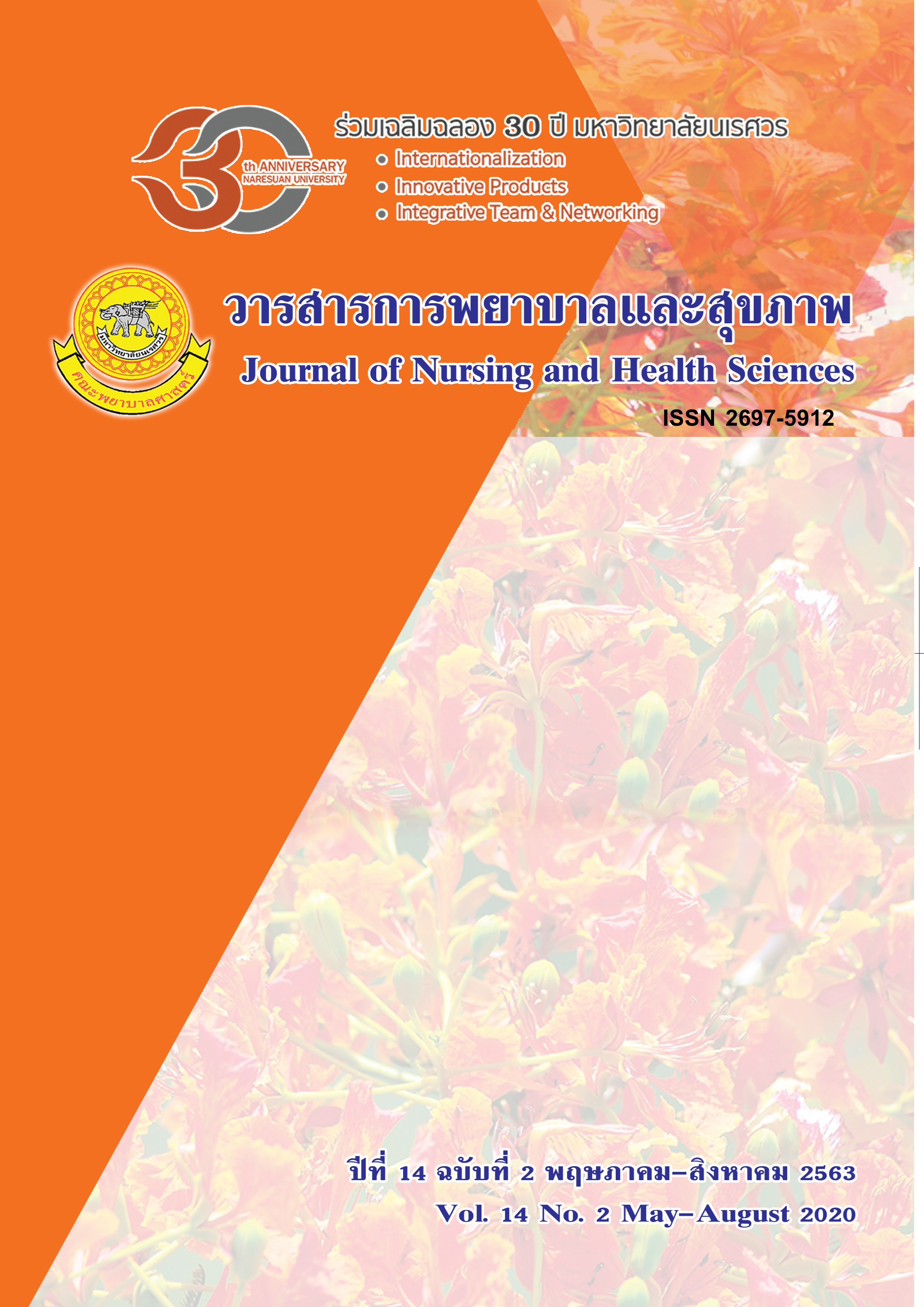ผลของโปรแกรมการจัดการตนเองโดยการมีส่วนร่วมของครอบครัวต่อการรับรู้ความสามารถของตน พฤติกรรมการดำเนินชีวิตอย่างมีสุขภาวะและระดับความดันโลหิตของผู้ป่วยโรคความดันโลหิตสูง
Main Article Content
บทคัดย่อ
การวิจัยครั้งนี้เป็นการวิจัยกึ่งทดลองแบบ 2 กลุ่มวัดผลก่อนและหลังการทดลองมีวัตถุประสงค์เพื่อประเมิน ผลของโปรแกรมส่งเสริมการจัดการตนเองโดยการมีส่วนร่วมของครอบครัวต่อการรับรู้ความสามารถของตน พฤติกรรมการดำเนินชีวิตอย่างมีสุขภาวะและระดับความดันโลหิตของผู้ป่วยโรคความดันโลหิตสูง กลุ่มตัวอย่าง เป็นผู้ป่วยโรคความดันโลหิตสูงในตำบลท่าช้าง อำเภอบ้านลาด จังหวัดเพชรบุรี จำนวน 60 คน แบ่งเป็นกลุ่มทดลอง และกลุ่มเปรียบเทียบ กลุ่มละ 30 คน กลุ่มทดลองได้รับโปรแกรมส่งเสริมการจัดการตนเองที่ประยุกต์จากแนวคิด จิตวิทยาเชิงบวกและแนวคิดการกำกับตนเองตามทฤษฎีปัญญาสังคมโดยการสนับสนุนของครอบครัวในการ ปรับเปลี่ยนพฤติกรรมสุขภาพเป็นเวลา 8 สัปดาห์ ส่วนกลุ่มเปรียบเทียบได้รับการดูแลตามปกติเก็บข้อมูลโดยแบบ สอบถามการรับรู้ความสามารถของตนและพฤติกรรมการดำเนินชีวิตอย่างมีสุขภาวะวิเคราะห์ข้อมูลด้วยสถิติ เชิงพรรณนา ทดสอบสมมติฐาน ด้วยการทดสอบค่าที ผลการวิจัยพบวา่ หลังการทดลอง1) คะแนนเฉลี่ยของการรับรูค้ วามสามารถของตนและคะแนนเฉลี่ยพฤติกรรม การดำเนินชีวิตอย่างมีสุขภาวะของกลุ่มทดลองมีค่าสูงกว่าก่อนการทดลอง (t = 34.75, p < .001 และ t = 24.40, p < .001 ตามลำดับ) และสูงกว่ากลุ่มเปรียบเทียบอย่างมีนัยสำคัญทางสถิติ (t = 17.62, p < .001 และ t =11.16, p < .001ตามลำดับ) และ 2) ค่าเฉลี่ยความดันโลหิตขณะหัวใจบีบตัวและคลายตัวของกลุ่มทดลองมีค่าต่ำกว่าก่อนการทดลอง (t = -6.64, p < .001 และ t = -3.38, p = .001 ตามลำดับ) และต่ำกว่ากลุ่มเปรียบเทียบอย่างมีนัยสำคัญทางสถิติ (t = -4.04, p < .001 และ t = -3.41, p = .001 ตามลำดับ) ผลการวิจัยแสดงให้เห็นว่าโปรแกรมการจัดการตนเองโดยการมีส่วนร่วม ของครอบครัวสามารถส่งเสริมและสนับสนุนให้ผู้ป่วยโรคความดันโลหิตสูงเกิดการปรับเปลี่ยนพฤติกรรมสุขภาพ และช่วยควบคุมระดับความดันโลหิตให้ดีขึ้นได้จึงควรนำโปรแกรมดังกล่าวนี้ไปใช้ในชุมชนต่อไป
Article Details
เอกสารอ้างอิง
Ahn, O., Cha, H., Chang, S., Cho, H-C, & Kim, H. (2015). Effect of an integrated health management program based on successful aging in Korean women. Public Health Nursing, 32(4), 307–315. https://doi.org/10.1111/phn.12177
Baiya, N., Chaumsang, C., Paechaiyaphoom, N., & Tangsungworadham, J. (2013). The effects of family nursing intervention program based on the illness belief model on the health behaviors of the hypertensive patients and health care behaviors of their family. Bangkok: Faculty of Medicine, Srinakharinwirot University. [In Thai].
Bandura, A. (1986). Social foundations of thought and action: A social cognitive theory. New Jersey: Prentice-Hall.
Cohen, J. (1992). A power primer. Psychological Bulletin, 112(1), 155–159. https://doi.org/10.1037/0033-2909.112.1.155
Department of Disease Control. (2017). Nursing course program for chronic non-communicable disease coordinators in the community. Bangkok: Bureau of Non-Communicable Diseases. [In Thai].
Division of Non Communicable Diseases. (2019). Non-communicable diseases data 2016-2018. Retrieved 20 June 2020 from http://www.thaincd.com/2016/mission/documents.php?tid=32&gid=1-020. [In Thai].
Harnden, K. E., Frayn, K. N., & Hodson, L. (2010). Dietary approaches to stop hypertension (Dash) diet: Applicability and acceptability to a UK population. Journal of Human Nutrition and Dietetics, 23(1), 3-10. https://doi.org/10.1111/j.1365-277X.2009.01007.x.
Huffman, J. C., Millstein, R. A.., Mastromauro, C. A., Moore, S. V., Celano, C. M., Bedoya, C. A., …Januzzi, J. L. (2016). A positive psychology intervention for patients with an acute coronary syndrome: Treatment development and proof-of-concept trial. Journal of Happiness Studies, 17(5), 1985-2006. https://doi.org/10.1007/s10902-015-9681-1.
Maxine, A. N., Hossein, Y., & Marcella, N. (2011). Self-management among patients living with diabetes in the United States Virgin Islands. Journal Health Care Poor Underserved, 22(1), 271-283. https://doi.org/ 10.1353/hpu.2011.0024.
Naik, A., Palmer, N., Petersen, N., Street, R., Rao, R., Suarez-Almazor, M., ...Haidet, P. (2011). Comparative effectiveness of goal setting in diabetes mellitus group clinics: Randomized clinical trial. Archives of Internal Medicine, 171(5), 453-459. https://doi.org/10.1001/archinternmed.2011.70.
Prompan, C., Khlewkhern, S., & Chanaboon, S. (2018). The effect of the health promotion program to improve behavior control of hypertension patient with hypertension in Noen Yang Sub-District, Kham Muang District, Kalasin Province. Journal of Nursing and Health Sciences, 12(4), 100-114. [In Thai].
Seesawang, J., Thongtaeng, P., & Yodthong, D. (2014). Effectiveness of self-management supportive program among hypertensive older people. Ramathibodi Nursing Journal, 20(2), 179-192. [In Thai].
Seligman, M. (2000). Positive psychology: An introduction. American Psychologist, 55, 5-14.
Singha, S., & Hingkanont, P. (2016). The effect of self-efficacy program on disease prevention behavior of high blood pressure risk group. Journal of Nursing and Health Sciences, 11(3), 81-92. [In Thai].
Songwatthanayuth, P., Watthanakorn, K., Klinhom, K., & Ratanapat, P. (2016). Effects of family and village health volunteer participation program on health promoting behaviors, and blood pressure in pre-hypertension adults. Veridian E-Journal, Science and Technology Silpakorn University, 3(3), 1-14. [In Thai].
Sutipan, P. (2016). Research and development of a self-management program on healthy lifestyle behaviors and health outcomes for the elderly with hypertension. Doctoral Dissertation (Applied Behavioral Science Research), Behavioral Science Research Institute, Srinakharinwirot University, Bangkok. [In Thai].
Tha Chang Health Promoting Hospital. (2016). Annual report on operation results 2016. Phetchaburi: Tha Chang Health Promoting Hospital. [In Thai].
Thai Hypertension Society. (2019). 2019 Thai guidelines on the treatment of hypertension. Bangkok: Author. [In Thai].


